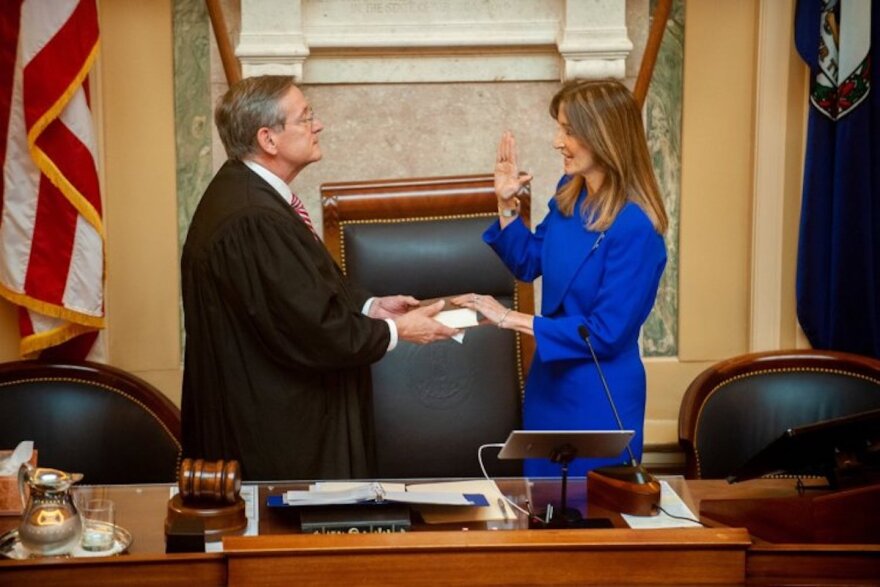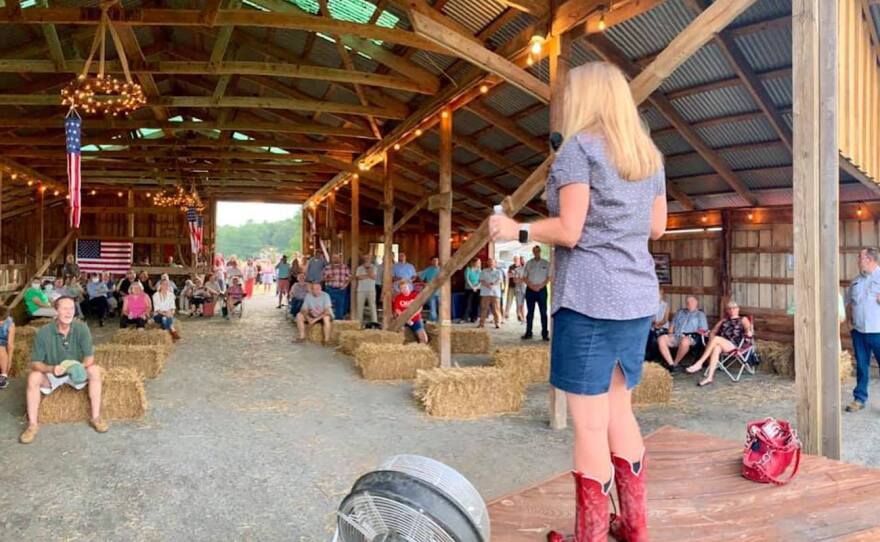Lawmakers in Virginia’s General Assembly have continued to solicit donations during the special session in a move that has raised eyebrows among some legislative observers.
Politicians serving in the legislature are prohibited from fundraising during their general sessions to avoid conflicts of interests. But no such rules apply to special sessions, which have generally lasted days rather than weeks.
The fundraising campaign has touched both parties and chambers.
A top Democrat who chairs the committee overseeing campaign finance reform, Del. Joseph Lindsey (D-Norfolk), held his annual Lindsey Golf Tournament shortly after the end of a virtual floor session on August 20. Participants who sunk a hole-in-one had a chance to win a trip to Hawaii.
In an interview, Lindsey said that he planned and received most contributions for the tournament months in advance and physically separated himself from donors for the virtual floor session. He categorically rejected any conflict of interest and said changing the date “would have cost a great deal of money” for a low-margin event. Still, Lindsey said he was open to changing special session fundraising rules when lawmakers meet next year.
“If there’s an appetite for the change in the rules, then I can tell you, if it comes before me, I’m going to vote for it,” Lindsey said. “I just think we need to be governed by rules, not by what people’s opinions are outside of the rules.”
As Lindsey is quick to point out, he is hardly alone.
At least $35,000 in donations have flowed to Speaker of the House Eileen Filler-Corn’s political action committee since the start of the special session, including a contribution from a donor who has expressed opposition to a bill that has so far languished during the session. Jake Rubenstein, a spokesperson for the speaker, said the contribution was part of an earlier fundraising push in July and had “absolutely no” bearing on her legislative actions.
A senior Republican senator, Ben Chafin (R-Russell), closed out his Monday last week with an up-to $5,000-per head Richmond dinner at Shagbark. A high school civics teacher, Del. Schuyler Van Valkenburg (D-Henrico), held a virtual “back-to-school” fundraiser featuring Sen. Jennifer McClellan (D-Richmond) on Thursday.
Nearly every statewide candidate for 2021, including gubernatorial hopefuls McClellan, Del. Jennifer Carroll Foy (D-Prince William) and Sen. Amanda Chase (R-Midlothian) have sent out regular fundraising emails during the session that began August 18. Other lawmakers, including Republican House Minority Leader Todd Gilbert (R-Shenandoah), have directly referenced work underway in the session as part of campaigning, warning that Democrats had introduced legislation that will "make Virginia families less safe.”
The special session solicitations comes after a long lull that accompanied the first few months of the pandemic, particularly among Republicans. Lawmakers are looking to replenish funds that were exhausted in last year’s elections and that they used to pay for staff, constituent services, and in the case of the House, next year’s elections, according to Jeff Ryer, a GOP consultant and spokesman for the Senate Republican caucus. They're also competing against national candidates for dollars, Ryer said.
Ryer argued special sessions, which ordinarily are tightly focused, should be treated differently than the annual general session when it comes to fundraising.
“First of all, you can’t plan for when the special’s going to be, exactly,” Ryer said. “You can’t suddenly suspend and get rid of events that have been planned for some time. It just isn’t practical.”
Accepting contributions during a special session can give the appearance of corruption even where none exists, said Josh Stanfield, the head of the progressive watchdog group Activate Virginia.
“They can stop people from asking them questions and making these insinuations by either changing campaign finance law, or simply as an internal policy, not asking for or accepting contributions,” said Stanfield, who also serves as a staffer for Del. Lee Carter (D-Manasas).

A Letter and Donation
On August 19, a group of electric cooperatives sent a letter to four top Democrats, all chairs of powerful committees: Sen. Janet Howell (D-Fairfax County), Sen. Dick Saslaw (D-Fairfax County), Del. Luke Torian (D-Prince William) and Del. Jeion Ward (D-Hampton).
They wanted to see changes to yet-to-be-filed legislation that would give consumers flexibility on paying debts owed to electric and gas utilities during the pandemic.
The next day, the fundraising arm for Filler-Corn -- who was not included in the letter -- reported a $15,000 donation from the Virginia Maryland & Delaware Association of Electric Cooperatives, a group that represents electric co-ops in the region. The group’s president was one of 14 executives who signed the letter to Democrats expressing concerns about utility repayment legislation, although they later expressed support for a House bill.
In the days since the letter was sent and the speaker received the $15,000 contribution, those bills have languished. Neither a utility bill sponsored by Del. Lashrecse Aird (D-Petersburg) nor a farther-reaching bill from Del. Jay Jones (D-Norfolk) have gotten a hearing in committee -- a process controlled by the speaker. Advocates say there still may be action through the budget or through a bill sponsored by McClellan that is making its way through the Senate.
Filler-Corn’s spokesman, Jake Rubenstein, didn’t rule out action on the utility bills, saying “committee schedules will remain flexible during this unprecedented special session.”
Both the speaker’s office and the donor denied any connection between the payment and the utility legislation.
Rubenstein said the contribution was part of a fundraising push from the speaker’s office in July, when she also drew large checks from Amazon and the Virginia Bankers’ Association. The speaker’s office has not actively solicited donations during the special session, he said.
VMDAEC spokesman Steve Johnson said their contribution was in line with summer donations to past speakers, though it was $5,000 larger than the checks they cut former Speaker Kirk Cox (R-Colonial Heights) in the summers of 2018 and 2019.
Filler-Corn’s fundraising committee also took in $20,000 from Verizon on August 22; neither a lobbyist nor a press contact for the company responded to requests for comment.
Campaign Finance Changes
Top Democrats put off action on campaign finance reform until the 2021 general session, arguing that they needed more time to study the issue and would return with a comprehensive bill. The speaker has signalled a willingness to consider changes when the chamber meets again in January.
"If proposals are made to limit the solicitation of campaign funds during an active special session, the Speaker would certainly look into it," Rubenstein said in a statement.
Lindsey said he expected the House to consider other changes, including possible limits on large donations from corporations and individuals.
This year’s special session is unique, both in scope and length. Special sessions have traditionally been used to tackle single issues, like redistricting or gun control, or to resolve budget differences. This year’s session may last over a month after expanding past the budget to include COVID-19 and criminal justice reform.
Any legislative fix would also have to account for political tactics like the monthslong special sessions Republicans kept open to limit former Gov. Terry McAuliffe’s powers to appoint justices. In 2014, McAuliffe proposed new limits on fundraising during a special session, but the proposal went nowhere.
A fix proposed by Josh Stanfield of Activate Virginia would limit contributions from groups with a registered lobbyist, but allow small donors to continue to give. He pointed to a 2015 bill that allowed Dominion Energy to keep excess earnings rather than return them to customers as proof of the power of political contributions from larger entities.
“They can say it's coincidental all they want in any given case,” Stanfield said. “But at a certain point, it becomes hard to believe.”
Ryer, the GOP consultant, said the nominally part-time legislature was going to face more of these dilemmas as its calendar expanded. Lawmakers held legislative meetings in some form in 167 out of the 253 workdays in 2019, according to a report released in July by the Richmond law firm Gentry Locke.
“The closer you move to a full-time legislature, the more you’re going to be in situations like this,” Ryer said.





